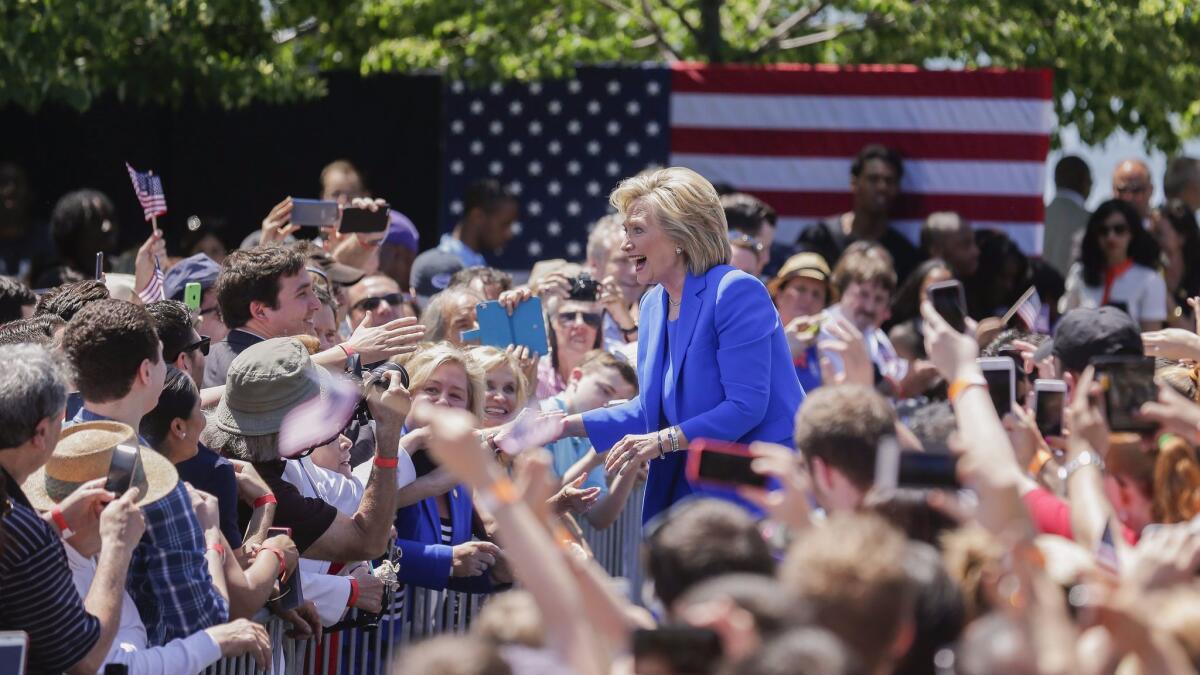Column: You’re probably tired of the presidential race, but long campaigns are a good thing

- Share via
Voters are sick and tired of this presidential campaign. In a poll by the Pew Research Center, 6 in 10 Americans said they were exhausted by the campaign — and that was four months ago. Another survey, sponsored by the American Psychological Assn., said the campaign had become a source of significant stress in many people’s lives. Among the most stressed-out, not surprisingly, are people who spend time on social media.
The dispiriting ordeal has spurred pop singer Sheryl Crow to launch an online petition asking the two major parties to make the next campaign shorter.
“We cannot sustain another lengthy slugfest like what we have witnessed for the past two years,” Crow wrote, summarizing the campaign as “ugliness … nonsense and fear-mongering.” More than 58,000 people, including Bette Midler and Courteney Cox, have signed the appeal.
But it’s not going to happen — and it shouldn’t.
We need plenty of time to figure out who our presidential nominees are, warts and all.
Crow and other reformers point enviously at Britain and Canada, where elections are blessedly brief. Canada chose a new prime minister last year; it took less than three months, from August to October, and some Canadians complained that even that was too long. Our campaign will have lasted roughly 23 months by election day, if you count the first “exploratory committee” announcement as the starting gun.
But the comparison with parliamentary systems is unfair. In Britain and Canada, there are no primaries; parties have elected leaders who become ready-made candidates for prime minister whenever an election is called.
Here at home, there’s no national authority in charge of our campaign calendar; individual states set the timing of primaries and caucuses. They jostle for dates at the front end of the calendar to maximize their influence (and, in Iowa and New Hampshire, their midwinter hotel bookings).
“The [U.S.] election process is the longest in the world because no one is in charge of it,” noted Steven Schier of Carleton College.
Structural issues aside, shorter campaigns are a bad idea on the merits — because we need plenty of time to figure out who our presidential nominees are, warts and all.
One good thing about our process is that it allows relatively unknown candidates to rise to the top of the heap. Bill Clinton was so small-time before the 1992 primary campaign that his name wasn’t included in some early polls. Bernie Sanders was an obscure Senate gadfly before he started running in 2015. Both managed to earn broad support — but they needed months to do it.
This year’s nominees, Donald Trump and Hillary Clinton, have been making national headlines for decades — but there was plenty of new information voters needed to learn about them, too. (They might have preferred not learning some of it — but they’re surely better off knowing before election day than after.)
In only the last six weeks, we’ve learned that Trump didn’t pay federal taxes for several years, that he mistreated Miss Universe contestants and wandered through their dressing rooms, and that he bragged (while wearing a microphone) of grabbing women by the, er, crotch.
During the same period, we’ve had an unprecedented look inside the workings of the Clinton campaign through stolen documents published by WikiLeaks, and we’ve learned that the FBI is reviewing newly discovered emails that apparently belong to Clinton aide Huma Abedin.
“Ask yourself, what do I know today about a candidate that I didn’t know three months ago?” Kathleen Hall Jamieson of the Annenberg Public Policy Center at the University of Pennsylvania, said recently. “If the answer is I know something that’s important to me, then the longer campaign has helped you.”
Some of those discoveries might have come to light in a shorter campaign, but not all of them.
For one thing, there are fewer investigative reporters and fewer media organizations digging into the candidates’ pasts than in earlier years. A shorter campaign would have given both candidates a better chance to keep their dirty laundry out of sight.
For another, this election features two unusually secretive candidates. Even after more than 18 months of campaigning, there’s still more that voters deserve to know. They ought to know more about Trump’s business entanglements, including what’s in his tax returns. And they have a right to know whether the FBI’s latest email discovery means that Clinton is in serious trouble.
So here’s a bold proposal: We ought to lengthen this campaign, not shorten it. Let it go into overtime. Keep the polls open and hold off counting votes until all those questions are cleared up.
Okay, I’m only kidding. Even I agree that this election has run too long. But be careful what you wish for. A shorter campaign might not be an improvement.
Twitter: @doylemcmanus
Follow the Opinion section on Twitter @latimesopinion and Facebook
More to Read
A cure for the common opinion
Get thought-provoking perspectives with our weekly newsletter.
You may occasionally receive promotional content from the Los Angeles Times.







